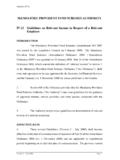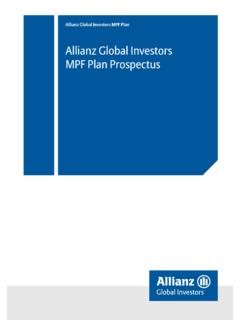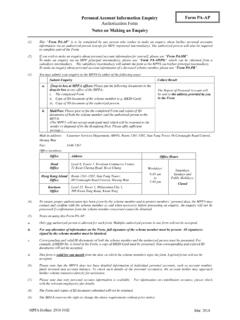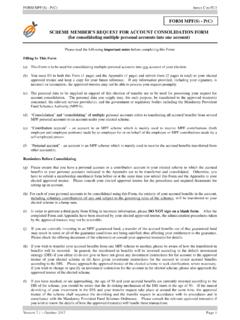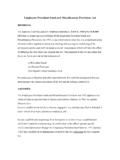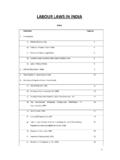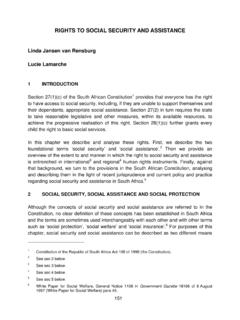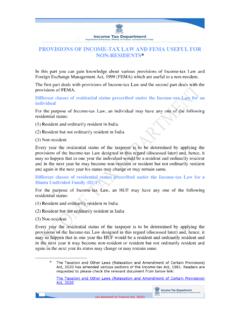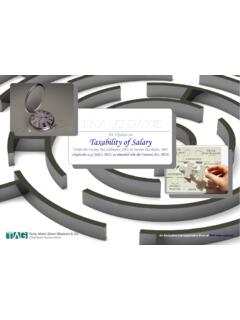Transcription of Managing Director’s Report - MPFA
1 8 ManagingDirector sReportThis is the last time that I present the MPFA s annual Report as its Managing Director. When Iwrote the Report for last year, I thought it was my last but somehow I managed to continue for onemore start, I am deeply thankful to all those who have contributed to the MPF System and the MPFA during my past three years as its Managing Director. Without the trust and support of theManagement Board and its Committees during these crucial years, we would not have made suchremarkable progress, both in operating the MPF System and the development of the achievements also have been built on the invaluable counsel and assistance provided by theMPF Schemes Advisory Committee and the Industry Schemes Committee. I must expressparticularly my deep gratitude to the MPFA Chairman, Mr Charles Lee, and the Government, bothfor their steer, support and understanding during my years as Managing this last Report , it may be tempting to present a summary of the past and then make a fewforward-looking remarks.
2 I have chosen not to do so. First, it would be too lengthy to give asufficiently ample account of what the MPFA has done. Second, the past is history: reminiscencesof a retiring Managing Director are not particularly useful. Instead, I would like to use the spacebelow to make a few observations, none of which is new but nonetheless need reiteration. The Chairman, in his Statement, has pointed out the rapidly ageing profile of our population,and the associated worsening dependency ratios. Whilst the gradual but deepening impact ofthis development may have just dawned on the people of Hong Kong, it is an unavoidable9 Mandatory provident fund Schemes Authority Annual Report 2002/03reality that must be faced. By now, I think most people should have come to realize thatthe capacity and resources of the Government are finite. Having already heavilycommitted its resources to education, health, welfare, etc, the Government simplycannot be expected to carry the provision of retirement benefits from the public purse.
3 Ifit were to take up and sustain such an unlimited programme, the only way would be toreduce other services and increase taxes at the same time. Mandatory retirement saving systems may take many forms. Some advocate a systemwith government guarantee and some prefer the system to operate on a pay-as-you-go basis. So far, to my knowledge, there has not been a single successful example of sucha system continuing on a sustainable basis in the whole world. Indeed, the usualoutcome (other than collapse of the system) has turned out to be either cutting back ofbenefits, substantial increase of contributions and taxes and/or deferment of thestatutory retirement age. Starting relatively late, Hong Kong has been able to learn fromothers mistakes and not fall into the same traps, however enticing some of the modelsmight have appeared at the beginning. At times of high asset price inflation, such as in the pre-1997 years, there was a goodchance that a reasonable nest egg could be put together by repeated capital gains in,say, trading up in properties, and savings for retirement schemes (compulsory orotherwise) conceivably could be argued as unnecessary.
4 But this is no longer a realoption, even in the long term. People s inclination to save and abilities to plan varywidely. Very often, individuals are so caught up with their more immediate financialconcerns during the most productive period of their lives that they fail to accumulate anadequate sum for their retirement. A certain degree of compulsion therefore isnecessary in order to furnish some assurance that an appropriate amount of assets isset aside for the future. Failing this, increasingly heavy reliance on the social safety netand a massive burden on future generations will be unavoidable. I would like to once again express my gratitude to the vast majority of employers,employees and self-employed persons for their forbearance and support, without whichthe MPF System would not have achieved such high compliance rates, despite the harsheconomic circumstances. I must also pay tribute specially to the employers who are notonly required to make contributions for their employees, but also have to go through thetrouble of setting up and maintaining the administrative systems to comply with the MPFrequirements.
5 Certain employers however have expressed discontent with the mechanism of offsettingMPF benefits with severance payments/long service payments (SP/LSP), which in factwas a major concession very reluctantly made by the labour sector in exchange for therealization of a retirement protection scheme for the workforce. Many labour groups arestill very dissatisfied about this offsetting mechanism because of the view that at leastthe offsetting against severance payment, if not long service payment, is unfair. Someemployers complain about employees making high-risk investment choices, resulting,under the current volatile investment environment, in less accrued MPF benefits availableManaging Director s Report Continued10for SP/LSP offsetting. These employers should not forget that the converse is also true, the investment environment is good, their contributions will generate income to lighten,if not eliminate, their SP/LSP responsibility.
6 Besides, employers are the ones who are vestedwith the right to choose the MPF trustees and MPF schemes for their employees. The SP/LSPlegislation pre-dated the MPF by many years. These employers discontent leads one to thinkthat, perhaps, some of them have never intended to provide for SP/LSP in any case, evenwithout MPF coming into the picture. Under the MPF System, the trustee of a MPF scheme is the central party having an overallresponsibility for the administration and management of the scheme. Trusteeship is not a newconcept and Hong Kong s trust law has a long history. It was with the widely understood andaccepted role of trustees in mind that MPF schemes were entrusted to them when the Systemwas designed. Under the MPF legislation, a trustee has an explicit fiduciary duty to serve thebest interests of fund members and are subject to legal liability. Part of the trustee s functionsmay be delegated to other service providers but a trustee has the duty to supervise andexercise proper control over these service providers.
7 A trustee s responsibilities as providedunder the Trustee Ordinance are not less stringent when applied to the MPF System. The MPF System is a social programme, first and foremost. The business opportunitiesfor the financial services sector are only secondary. Means and ends should not beconfused. It is not MPF s aim to boost the markets - local, overseas, financial, property,or whatever. The financial infrastructure is only an instrument to facilitate the socialprogramme. It is therefore imperative for the MPFA to focus on protection of employees rights and benefits and apply prudential regulation/supervision to MPF-related financialservices. Investment vehicles for MPF should be evaluated in terms of return and securityfrom the point of view of scheme members. In any case, even though the legally requiredproportion of Hong Kong dollar denominated assets of a MPF constituent fund is 30%,the actual proportion is around 60%.
8 Matching of assets and liabilities and diversificationare basic risk management principles crucial to regulators and service providers is not necessary for politicians to exercise themselves over such matters. With MPF being mandatory in nature, the basic approach of the regulation of MPF-relatedinvestment products, almost by definition and certainly of necessity, should be more stringentand detail-specific than those not intended for MPF where caveat emptor should have alarger role in the overall scheme of things. It would be up to the service providers to decidewhether they wish to enter into MPF business and abide by the MPF rules, in addition tocoming under the ambit of other regulators with regard to their non-MPF businesses. Hong Kong always has maintained a free market philosophy. Price control will only beconsidered under special situations. Hence, there is no policy to control the fees and chargesunder the MPF System.
9 Only the administrative charges of capital preservation funds are keptunder some regulation. Instead, competition and transparency are two important elements toensure a cost-effective and efficient market. In the coming few years, MPFA will focus itsresources and attention on improving transparency and disclosure of MPF products. I hopethat, with extensive consultation, measures to tighten regulation with regard to the disclosure11 Mandatory provident fund Schemes Authority Annual Report 2002/03of fees and charges and investment performance will be implemented in stages with theMPF industry s support and cooperation. However, even with less than full consensus ofthe industry, it is still imperative that the System be improved and strengthened in theseaspects. The argument that an average scheme member would not be able tounderstand or cannot be bothered with the information disclosed is unacceptable asscheme members should not be deprived of the opportunity to enhance their investmentknowledge and their right to be properly informed.
10 It is the responsibility of theauthorities and the service providers to ensure that information concerning schememembers rights and benefits is set out in a language that they can comprehend. In anycase, we must never under-estimate the good sense and discerning power of theaverage scheme member. After all, it is his or her I close, I wish to say that I have been very fortunate to have the staunch support ofvery capable, professional, dedicated and enthusiastic colleagues, whose commitment andhard work have been indispensible in enabling the MPFA to achieve its mission and to deliverthe level and quality of performance clearly demonstrated since the inception of the MPFA, as an organization, has always been under stringent public scrutiny. Itsestablishment (including staff s pay levels) was mapped out in the aftermath of the Asianfinancial turmoil and in a setting of deflation and high unemployment.

